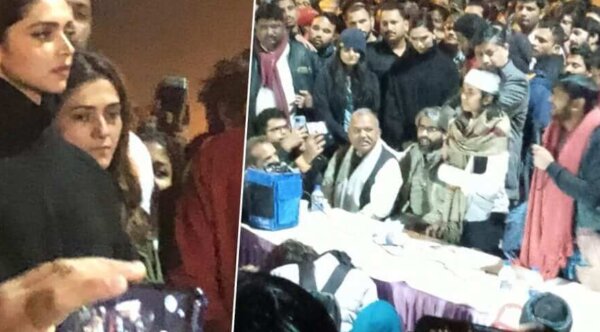
The student of Delhi’s Jawaharlal Nehru University (JNU) are engaged in ongoing protests in the aftermath of a mob attack on campus. For months, students at JNU have protested “an announced rise in fees as well as a new citizenship law, which critics say discriminates against Muslims and erodes India’s secular constitution” (Reuters, 2020). On Sunday, January 5, 2020 a group of masked men stormed campus with sticks, injuring at least 30 students. Following the attack, students, including those harmed, continued to rally.
And on Tuesday, January 7, 2020, an unexpected supporter joined them: Bollywood superstar Deepika Padukone. Padukone did not make any speeches or draw attention to herself, offering quiet solidarity with her presence, leaving and arriving with discretion. This, however, did not prevent a social media firestorm, “a frenzy that only a Bollywood star can whip up in movie-mad India” (Biswas, 2020). Padukone’s presence provoked mixed reactions among Indians and Bollywood fans. The tensions have led to simultaneous hashtags supporting Padukone and calling for a boycott of her latest movie released January 10, 2020.
Student leaders like former JNU Student’s Union president Kanhaiya Kumar thanked her for her “solidarity and support,” telling her “you might be abused or trolled today, but history will remember you for your courage and standing by the idea of India” (Biswas, 2020). Supporters even promised to watch her new film—“Chhapaak”—about acid attack survivor Laxmi Agarwal, which Padukone both acted in and produced. Actor Anurag Kashyap called for “all those who stand against the violence go to @bookmyshow” and purchase tickets (Reuters, 2020).
Yet some of Padukone’s peers dismissed her. Vivek Ranjan Agnihotri, a filmmaker and supporter of India’s controversial conservative Prime Minister, Narendra Modi, argued “by standing with this small community of anti-India students she has sent a message that she doesn’t support 98% India-loving students” (Biswas, 2020). The Rajasthan Deputy Chief Minister, Sachin Pilot, condemned boycott attempts; he argued “it’s a very narrow mindset if any actor or actress is not in your favour, then you talk about boycotting their films” (PTI, 2020). For some, the timing of the controversial move enhances perceptions of how much Padukone risked in acting on her convictions; with the release of “Chhapaak” looming, a lot is on the line. For others, the timing reads as a publicity stunt to promote the film, tweeting “what a brazen [and] cheap tactic to promote a film” (Reuters, 2020).
Stunt or not, Padukone is, on the whole, receiving more support than criticism with her follower counts increasing and critics calling “Chhapaak” an “important film to watch” (Pereira, 2020). The same internet explosion might not happen for another artist, but Padukone has tens of millions of followers on both Instagram and Twitter and in 2016 was ranked by Forbes as the 10th highest paid actress in the world. A big name brings big drama.
The JNU protests were not the first time Padukone faced controversy for her personal or profession life. Before the release of her film “Padmaavat,” members of the fringe group Rajput Karni Sena called for a nationwide ban, vandalized theaters, and threatened the actress physically. Member Mahipal Singh Makrana said in a video statement that “if need be, we will do to Deepika what Lakshman did to Shurpanakha,” meaning cut off her nose (Pereira, 2020). Amidst the same controversy, a mid-level media coordinator of Modi’s Bharatiya Janata Party reportedly put a bounty on Padukone’s head.
The case of Padukone and the Delhi protests brings up the larger issue: how involved should celebrities be in protests or persuasive campaigns? Celebrities hold much power in the public realm, but it is unclear that they possess any special insight into situations of social injustice. Alternatively, their power comes with a price. Since they depend on publicity to gain followers, fans, and audiences, negative publicity due to issues unrelated to their films might harm their ability to continue making popular or successful media artifacts. Despite the common perception that Bollywood stars often avoid politics, the Padukone case highlights the ways the two are more frequently intersecting. Director Mahesh Bhatt explains the struggle between the Bollywood and political power, arguing a Bollywood filmmaker is “a vulnerable animal, especially when his film inches toward release. You can blackmail and make him kneel down” (Biswas, 2020). But Bollywood celebrities might bring attention and energy to situations and causes that otherwise might go unnoticed. Padukone surely brought more attention to the Delhi protests from the Indian media, and India’s Prime Minister Narendra Modi often uses the power of other Bollywood figures to his advantage, taking selfies and spending time with supportive members of the filmmaking elite. Given the risks and potential uses of Bollywood celebrity status, India is confronting more and more the question of when Bollywood drama and power should yield to the power of ordinary politics.
Discussion Questions:
- Should filmmakers and actors consider economic repercussions before speaking out on political issues or controversies?
- What role should artists have in shaping political discourse? Do artists and celebrities have different responsibilities than ordinary protestors?
- Is it more ethical for celebrities with great influence to avoid or embrace politics?
- What are the ethical issues in boycotting or “cancelling” celebrities for their politics?
Further Information:
Soutik Biswas, “Deepika Padukone: Has Bollywood found a political voice?” BBC News, January 8, 2020. Available at: https://www.bbc.com/news/world-asia-india-51030991
Karen Pereira, “‘Padmaavat’ to ‘Chhapaak’: 4 times Deepika Padukone stood her ground in the face of threats, violence and controversy.” Times of India, January 9, 2020. Available at: https://timesofindia.indiatimes.com/entertainment/hindi/bollywood/news/padmaavat-to-chhapaak-4-times-deepika-padukone-stood-her-ground-in-the-face-of-threats-violence-and-controversy/articleshow/73172040.cms
PTI, “Deepika Padukone’s JNU visit: Sachin Pilot condemns ‘Chhapaak’ boycott, says more people will watch the movie new.” The Economic Times, January 9, 2020. Available at: https://economictimes.indiatimes.com/magazines/panache/deepika-padukones-jnu-visit-sachin-pilot-condemns-chhapaak-boycott-says-more-people-will-watch-the-movie-now/articleshow/73167513.cms
Reuters, “Bollywood actor faces boycott calls after joining student protest.” The Guardian, January 8, 2020. Available at: https://www.theguardian.com/world/2020/jan/08/deepika-padukone-bollywood-actor-faces-boycott-calls-after-joining-student-protest
Authors:
Dakota Park-Ozee & Scott R. Stroud Ph.D.
Media Ethics Initiative
Center for Media Engagement
University of Texas at Austin
March 19, 2020
Images: Twitter / modified
This case was produced by the Center for Media Engagement with support from the South Asia Institute. It can be used in unmodified PDF form without permission for classroom or educational uses. For use in publications such as textbooks, readers, and other works, please contact the Center for Media Engagement.
Ethics Case Study © 2020 by Center for Media Engagement is licensed under CC BY-NC-SA 4.0



